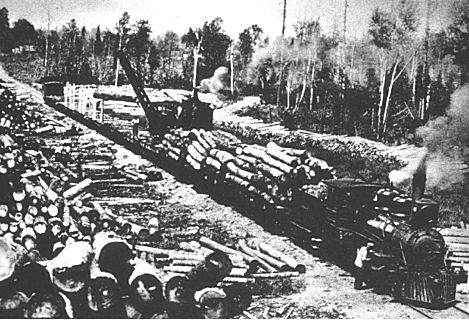- Details
- Hits: 3108
Railroad: Manistique Railway Company
The Manistique Railway was a logging railroad which was built from Seney north to Grand Marias on Lake Superior in 1893. The railroad had several branch lines. It was sold to the Manistique Lumber Company in 1910 and to the Escanaba Lumber Co. the same year. It was abandoned shortly thereafter. [MRL]
Built → Manistique Railway → Sold to Manistique Lumber Co. → Abandoned
Chartered: 1986.
Built: 1886 - Seney to Hoist. Controlled at incorporation by Alger, Smith & Company.
Operated for 21 Years
Sold: 1910 - part of line to Lake Superior Iron & Chemical. Remainder abandoned.
Reference: [MRRC]

This line was 45.5 miles in length from Grand Marais (on Lake Superior) to Diller. They also had a branch line from Lisbon to Camp 15 of 11 miles, and from Beaver to Camp 12 of 15.5 miles. This was a standard gauge railroad. The railroad crossed the DSSS&A at grade at Seney and the crossing was protected by a Gravitt interlocking and derailing device. There were 14 stations on the line. [MCR-1904]
Image Info: Manistique Railway logging train between Seney and Grand Marias in the early 1900's. [National Park Service]
Notes
This line was owned by Russell Alger, who had moved his successful logging operations in Alcona (lower peninsula) to the eastern upper peninsula.
M.S. Smith is on the board of the Manistique Railway Co. He is also vice president and treasurer of the Manistique Lumber Company and treasurer of the Alger, Smith & Co. logging company. [DFP-1895-1895-0910]
Time Line
1886. Line built from Seney to Hoist, 5.5 miles. [MRL]
1887. Line extended from Hoist to Camp 10 for a total of 12 miles. [MRL]
1891. Branch built from Grand Marais Junction to Baker Camp, 4 miles. [MRL]
1891. May. For the three months ending March 15, the Manistique railway transported over 30,000,000 feet of logs. [OT-1891-0501]
1893. Main line finished from Camp 10 to Grand Marais, an additional 20 miles, and south from Seney to Germfask, 7 miles. [MRL]
1895. The mail from Seney to Grand Marais is still carried by dog sledges (sic) notwithstanding the fact that the Manistique Railway has been completed to the latter place and has a train daily each way. The people are kicking and want the mail sent by train. [CCA-1895-0214]
1895. The Manistique Railway Co. has decreed that all employees must quit drinking or resign their jobs. Several men refused to give up their toddy and are looking for work elsewhere. [CCA-1895-0411]
1899. Line is removed from Grand Marais Jct. to Baker Camp. [MRL]
1902. The principal business of this road is the transportation of logs and other forest products, one mixed train is run each way, daily, for the accommodation of passenger traffic. A new station is built at Germfask. [MCR-1902]
1902. Line is extended from Germfask to Diller using 45 lb. rail, and then to Curtis (in 1904) and Wilman (in 1906).
1902. Operated from Grand Marais to Germfask. Principal business is forest products. One mixed train is run each way daily. [MCR-1903]
1903. SNAPSHOT. The railroad employed 4 engineers and fireman, 3 conductors, 8 brakemen, 1 baggagemen, 36 laborers (mostly section hands), 9 shopmen and 1 yardman. It operated four locomotives, 1 passenger car, 5 box cars, 93 platform cars and 3 conductors' way cars. 85% of the freight tonnage of the road was logs. [MCR-1904]
1909. SNAPSHOT. John Millen is General Manager, based in Grand Marais, Mich. One daily round trip between Grand Marais and Seney and connection with the Duluth, South Shore & Atlantic Ry. Train leaves Grand Marias at 940 a.m. arriving at Wilman and south of Seney (54 miles) at 1:36 p.m. Northbound leaves Wilman at 1:45 p.m. arriving at Grand Marais at 5:45 p.m.
1910. Present prospects are that the Village of Grand Marais practically will go out of existence as a result of the recent foreclosure sale of the Manistique railway to the Manistique Lumbering Co., holder of the bonds, and the decision of the latter to abandon and dismantle the property. Only a partial train service is being maintained at present, and it is stated that even this will be discontinued at the end of the month. Attempts to induce capital to take over the property have failed. Grand Marais is largely dependent upon the railroad for its supplies and for the shipment of lumber and other products, it is considered to have received its death blow. [UVC-1910-1028]
1910. Line is sold to the Manistique Lumber Co. and the Escanaba Lumber Co. These were not common-carrier railroads. Operated for a couple of years and abandoned.
Bibliography
The following sources are utilized in this website. [SOURCE-YEAR-MMDD-PG]:
- [AAB| = All Aboard!, by Willis Dunbar, Eerdmans Publishing, Grand Rapids ©1969.
- [AAN] = Alpena Argus newspaper.
- [AARQJ] = American Association of Railroads Quiz Jr. pamphlet. © 1956
- [AATHA] = Ann Arbor Railroad Technical and Historical Association newsletter "The Double A"
- [AB] = Information provided at Michigan History Conference from Andrew Bailey, Port Huron, MI

